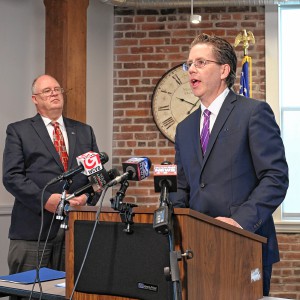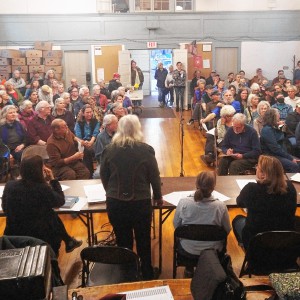Beacon Hill Roll Call: Oct. 16 to Oct. 20, 2023

A train speeds north crossing North Hillside Road in Deerfield. The Transportation Committee held a hearing on legislation that would prohibit a locomotive train engine from idling longer than 30 minutes. The measure would also require the Department of Environmental Protection to investigate idling violations and conduct emissions tests to determine whether a train’s emissions exceed carbon regulations, in which case the violator would be fined up to $5,000 per incident. STAFF FILE PHOTO/PAUL FRANZ
| Published: 10-27-2023 12:24 PM |
Beacon Hill Roll Call records local representatives’ and senators’ votes from the week of Oct. 16 to Oct. 20.
The House, 120-38, approved and sent to the Senate a bill that changes some of the state’s gun laws. Provisions include limiting the carrying of guns into public places including schools, polling places, government buildings and the private residences of others, with an exemption for law enforcement; cracking down on the spread of “ghost guns” with new registration requirements; updating the statewide ban on assault weapons; streamlining the licensing process; and changing the state’s “red flag” law by expanding who may petition a court for an extreme risk protection order against a person who poses a risk of causing bodily injury to themselves or others beyond just household members and law enforcement to include school administrators, medical professionals and employers.
“Today, as we have always done in the area of firearm safety, the House takes the lead in acting to make the commonwealth a safer place by giving law enforcement the tools they need to go after ghost guns, keeping battlefield weapons out of our neighborhoods and keeping our schools, homes, town halls and polling locations safe,” said chief sponsor Rep. Mike Day, D-Stoneham, House chair of the Judiciary Committee. “While Washington is paralyzed by dysfunction that endangers Americans across the country, we in Massachusetts address our challenges directly and take the steps necessary to modernize our firearms laws to keep us safe.”
“The comprehensive gun reform legislation that the House passed today will make Massachusetts residents safer and will further strengthen the commonwealth’s status as a national leader in the effort to combat gun violence,” said House Speaker Ron Mariano, D-Quincy. “While the commonwealth annually ranks as one of the safest states in the entire country from gun violence, the Supreme Court’s [New York State Rifle and Pistol Association, Inc. v.] Bruen decision nullified existing components of our gun laws, threatening the safety of the commonwealth’s residents. With the passage of this legislation, the House has once again displayed an unwavering commitment to ensuring that Massachusetts remains one of the safest states in the country.”
“Massachusetts already has some of the strictest firearms laws in the country, along with the lowest rate of deaths associated with gun violence,” said Rep. Steve Xiarhos, R-Barnstable. “The vast majority of gun-related crimes are committed with illegal weapons and not with legally owned firearms, and the focus of the bill should be based on listening to our Massachusetts police chiefs and on punishing those who break the law rather than targeting law-abiding citizens.”
“Instead of focusing on the elimination of ghost guns and the link between mental health and gun ownership, this legislation attacks legal, law-abiding gun owners who follow the rules,” said Rep. Todd Smola, R-Warren. “The Massachusetts Chiefs of Police Association unanimously opposed this legislation, yet the proponents of this bill never said a single word to address their objection. Unfortunately, we missed an opportunity to target the real issues related to gun violence in this bill.”
Article continues after...
Yesterday's Most Read Articles
 1989 homicide victim found in Warwick ID’d through genetic testing, but some mysteries remain
1989 homicide victim found in Warwick ID’d through genetic testing, but some mysteries remain
 Fogbuster Coffee Works, formerly Pierce Brothers, celebrating 30 years in business
Fogbuster Coffee Works, formerly Pierce Brothers, celebrating 30 years in business
 Greenfield homicide victim to be memorialized in Pittsfield
Greenfield homicide victim to be memorialized in Pittsfield
 Real Estate Transactions: May 3, 2024
Real Estate Transactions: May 3, 2024
 Battery storage bylaw passes in Wendell
Battery storage bylaw passes in Wendell
 As I See It: Between Israel and Palestine: Which side should we be on, and why?
As I See It: Between Israel and Palestine: Which side should we be on, and why?
A “Yes” vote is for the bill. A “No” vote is against it.
Rep. Natalie Blais — Yes
Rep. Aaron Saunders — No
Rep. Susannah Whipps — No
The House, 130-27, upheld the ruling of the chair that the debate can begin on the gun bill despite the fact that it does not include a fiscal note detailing the cost of the proposal.
House GOP Minority Leader Rep. Brad Jones, R-North Reading, moved to delay action on the bill because he said House rules require that any legislation reported from the House Ways and Means Committee that has a cost exceeding $100,000 must be accompanied by a fiscal note detailing the amount of public money that will need to be spent to carry out the provisions of the proposal.
However, acting House Speaker Rep. Kate Hogan, D-Stow, ruled that a fiscal note is not necessary.
Beacon Hill Roll Call asked the top two Democratic leaders in the House to comment on the ruling and why they voted in favor of it. House Speaker Ron Mariano, D-Quincy, and Majority Leader Frank Moran, D-Lawrence, did not respond to repeated requests for a comment.
“In my opinion, the lack of a fiscal note on [the bill] is a clear violation of House Rule 33,” Jones said. “There is no way that implementing the many provisions contained in this bill will not exceed a cost of $100,000. Based on my conversations with stakeholders, the provision requiring the State Police to take over the inspections of firearms dealers from local jurisdictions alone is likely to cost $1 million to $2 million per year. Before voting on such an expansive bill, House members and the public have a right to know how much its implementation is going to cost the state’s taxpayers.”
A “Yes” vote supports the ruling of the chair that debate can proceed despite the lack of a fiscal note. A “No” vote is against allowing debate to proceed and supports the requirement that a fiscal note be included before debate begins.
Rep. Natalie Blais — Yes
Rep. Aaron Saunders — Yes
Rep. Susannah Whipps — No
The House, 158-0, approved an amendment designed to clarify that the bill does not ban off-duty police officers from carrying firearms in certain restricted spaces, as long as the weapon is provided by their department. The legislation originally allowed only active, on-duty police to carry guns in those spaces.
“Most, if not all of us, have heard from our law enforcement community with concerns about when and where they would be allowed to carry firearms when not on official duty,” said amendment sponsor Rep. Mark Cusack, D-Braintree. “I am offering this amendment … to clarify that off-duty active law enforcement officers would be allowed to carry their department-issued firearms in the following places: a place owned, leased or under the control of state, county or municipal government and used for the purpose of government administration; a location in use at the time of possession as a polling place and for the storage and tabulation of ballots; and an elementary school, secondary school, college and university, including transport used for the students, in the areas contained within.”
A “Yes” vote is for the amendment.
Rep. Natalie Blais — Yes
Rep. Aaron Saunders — Yes
Rep. Susannah Whipps — Yes
The House, 26-132, rejected an amendment that would allow the state to move, based on dangerousness, for an order of pretrial detention or release on conditions when a person has been charged with covert weapons violations or illegal possession of a firearm.
Supporters said the amendment would give prosecutors the tools necessary to hold dangerous people accountable and protect victims of gun violence.
Rep. Alyson Sullivan, R-Abington, the sponsor of the amendment, did not respond to repeated requests by Beacon Hill Roll Call to comment on her amendment.
“This amendment is actually part of a number of bills that are currently before the Judiciary Committee,” said Rep. Christine Barber, D-Somerville, who urged members to vote against the amendment. “A number of those bills would expand the pretrial detention of people. And this committee takes the issue of expanding pretrial detention very seriously. The committee is currently vetting those proposals, and rather than taking a piecemeal approach of this one piece, that committee is looking at all the related bills in a thoughtful manner. And so we’re continuing to take a full look at this issue and I look forward to those discussions.”
A “No” vote is against the amendment.
Rep. Natalie Blais — No
Rep. Aaron Saunders — No
Rep. Susannah Whipps — No
The Senate, 38-1, approved a bill, named the Frances Perkins Workplace Equity Act, in honor of the first woman to serve as U.S. Labor Secretary. The measure would require employers with 25 or more employees to disclose a salary range when posting a job position. The measure also would require employers with 100 or more employees to file annual employment data reports, including information on employee demographics and salaries, with the state. In addition, the bill directs the Executive Office of Labor and Workforce Development to track compensation data and file an annual report on data showing the state’s progress toward equal pay for equal work.
The House has already approved a different version of the proposal. The Senate version now goes to the House for consideration.
Supporters said that in the Greater Boston area in 2021, women on average were paid 70 cents for every dollar earned by a man. They noted this gap widens among communities of color.
“Many workers, especially women and people of color, underestimate their own value in the job market,” said Sen. Pat Jehlen, D-Somerville. “The 2016 Equal Pay Act made real progress on breaking down barriers by banning employers asking applicants for salary history. This helped women and people of color who were changing jobs because their past low pay didn’t follow them their whole lives. However, it didn’t help applicants learn how much a job could pay or how to assess their work’s value to be able to get past the new barrier of their salary expectations. This bill will give workers a better chance to be paid fairly by giving them straightforward information and help them have reasonable expectations.”
“In the commonwealth of Massachusetts, we take pride in our world-class academic institutions, competitive talent pool and vast opportunities for economic success,” said Sen. Paul Feeney, D-Foxborough. “Yet when we take a closer look at the earnings of commonwealth residents, it is clear we continue to fall short of closing long-standing racial and gender wage gaps that dramatically suppress the earnings of women and people of color. By requiring disclosure of salary ranges for an open job posting, publishing aggregate demographic data to track wage inequities by race and gender across industries, and protecting an employee’s right to ask for salary range information in the workplace, we have the opportunity to recruit and retain skilled workers while closing the wage gap and ultimately boosting our commonwealth’s competitive edge.”
“While I agree with the overarching concept of salary range transparency postings for larger businesses, I voted ‘no’ on this bill because it would place an undue burden on small business,” said Sen. Ryan Fattman, R-Sutton, the lone opponent of the measure. “Subjecting small businesses, who employ even as few as 25 individuals, to the salary range posting portion of the bill with violation fines for failing to properly disclose said information is unnecessary. Most small businesses are not equipped with the technical tools to develop the most accurate salary ranges for their job postings. With its existing laws, Massachusetts already makes it difficult to run a business free of excessive government mandates and penalties.”
A “Yes” vote is for the bill.
Sen. Joanne Comerford — Yes
Sen. Paul Mark — Yes
The Consumer Protection and Professional Licensure Committee held a hearing on legislation that would require that the total price of tickets for live entertainment events, including fees, be displayed to consumers in a clear and conspicuous manner at the beginning of the purchasing process. The measure would also prohibit price increases during the purchasing process.
“Far too often, surprise fees pop up at the end of the ticket purchasing process that consumers throughout Massachusetts had no idea about,” said sponsor Sen. John Velis, D-Westfield. “Whether it’s tickets to a Taylor Swift concert or a Patriots game, people shouldn’t have to struggle through the process of finding tickets and then learn that they can’t even afford them anymore. At the most fundamental level, this legislation enables folks to know their budget when they go in to buy tickets and know the amount that they’re ultimately going to be asked to spend.”
The Financial Services Committee held a hearing on a proposal that would require all health care plans to provide coverage for hearing aids.
“I have heard from constituents about the high cost of hearing aids, and as a caregiver myself, I witnessed the vital need for seniors to be able to hear in order to communicate and advocate for themselves,” said sponsor Rep. Kristin Kassner, D-Hamilton. “It’s stunning to me that these important medical devices are not covered by insurance. This bill seeks to rectify that.”
The Committee on Economic Development and Emerging Technologies held a hearing on a measure that would create a Student Entrepreneurial and Economic Investment Fund to provide an opportunity for interested students to gain experience in entrepreneurialism and early-stage business development while fostering an economic environment that will attract students to the commonwealth and forge a relationship between the public higher education system and the business community.
“Under Massachusetts’ current exam-driven public education system, attention to entrepreneurship and personal improvement beyond the classroom is often forgotten,” said sponsor House Minority Leader Rep. Brad Jones, R-North Reading. “This legislation will provide valuable opportunities for students, encourage them to develop relationships with the public higher education system and the Massachusetts business community, and contribute to the present and future economic growth of the commonwealth.”
The Health Care Financing Committee held a hearing on a bill that would expand smoking cessation benefits for MassHealth recipients by providing coverage for additional cessation services including individual, group and phone counseling by a physician, dentist, behavioral health counselor, mental health counselor, certified tobacco use cessation counselor or other qualified clinicians. MassHealth is the state’s Medicaid program that provides health care for low-income and disabled persons.
“[The bill] would increase the number of certified practitioners available to provide evidence-based counseling for those seeking assistance quitting tobacco,” said sponsor Rep. Christine Barber, D-Somerville. “Not only will this legislation help smokers identify their resources for quitting, but it could inspire someone who would not otherwise have taken on the difficult task of ending their addiction to do so.”
Another measure heard by the Health Care Financing Committee would prohibit any state funds from being made available to Planned Parenthood Federation of America, or to any of its affiliates.
“Planned Parenthood is a well-funded organization that is often very politically active and very partisan,” said Rep. Joseph McKenna, R-Webster. “I believe that this alone is enough to keep it from receiving state funding. I further feel that those who believe that abortion, the taking of a human baby’s life, is morally reprehensible should not have their tax dollars go to a private organization who has this as its core mission.”
The Transportation Committee held a hearing on legislation that would prohibit a locomotive train engine from idling longer than 30 minutes. The measure would also require the Department of Environmental Protection to investigate idling violations and conduct emissions tests to determine whether a train’s emissions exceed carbon regulations, in which case the violator would be fined up to $5,000 per incident.
Supporters said that trains will often park and idle for up to 24 hours, creating a nuisance for those living in nearby neighborhoods and harming the environment as well. They noted there are existing laws dealing with idling motor vehicles, including school buses, but the issue of trains idling in communities across the state has not been adequately addressed.
“This isn’t solely a regional concern; it affects communities spanning from Cape Cod to the Berkshires,” said sponsor Rep. John Barrett, D-North Adams. “[The bill] will prevent unnecessary emissions and improve the quality of life for those who live close to idling trains.”
The Public Service Committee held a hearing on a proposal that would change the current law that pays the family of a deceased police officer, firefighter or corrections officer the maximum pay for the position the person holds even if that person had not reached the maximum pay level. The bill would increase the pension given to the family of the deceased by giving them the next grade-step above his or her position after their death.
“I believe this bill is important so those who have perished while protecting their communities can continue to support their families and loved ones after their passing,” said sponsor Rep. Angelo Puppolo, D-Springfield. “Providing these benefits relieves some of the burden from those left behind by someone who perished while actively fulfilling their roles and duties.”

 Wear Orange organizers prepare display to remember gun violence victims
Wear Orange organizers prepare display to remember gun violence victims Deerfield candidates, Whately incumbent discuss issues with voters at South County Senior Center
Deerfield candidates, Whately incumbent discuss issues with voters at South County Senior Center
